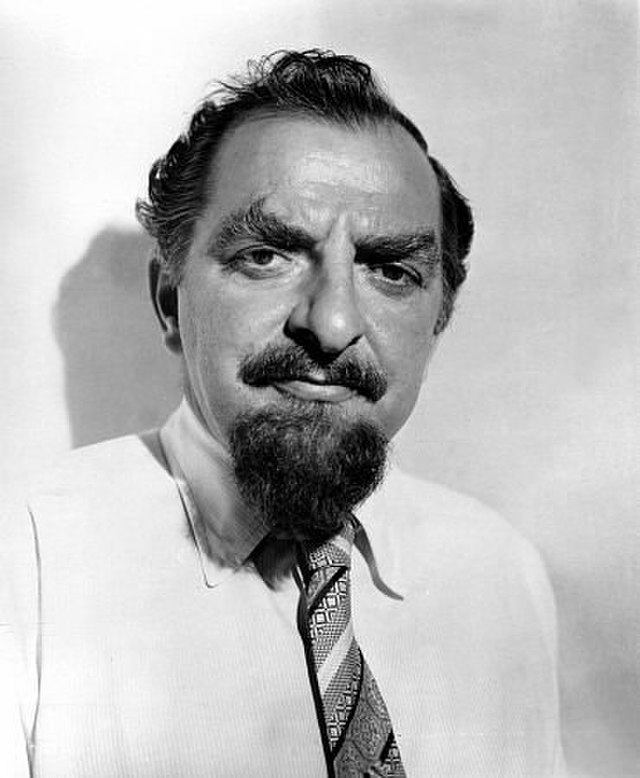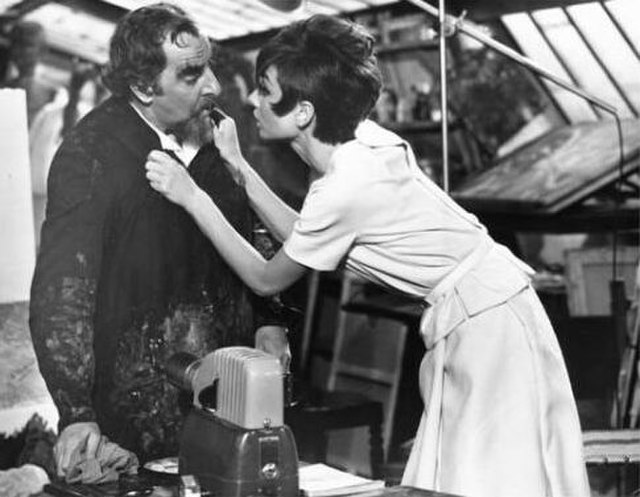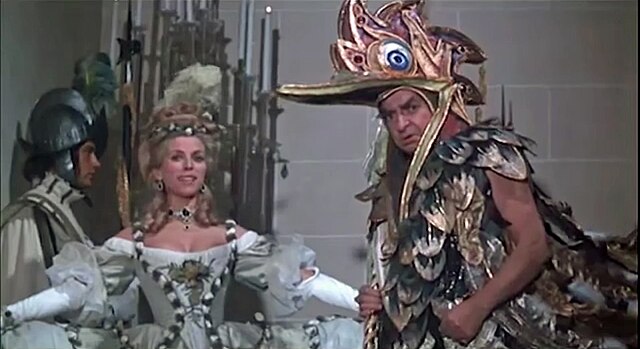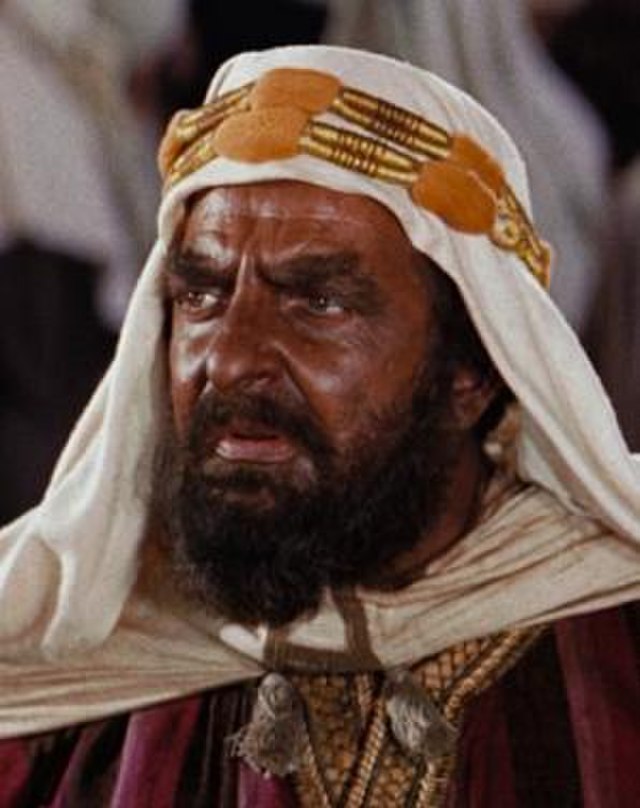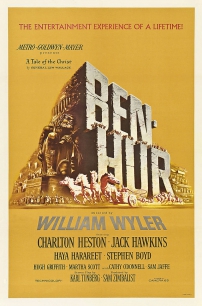Hugh Griffith
back| Full Name | Hugh Emrys Griffith |
| Stage Name | Hugh Griffith |
| Born | May 30, 1912 |
| Birthplace | Marian-glas, Anglesey, Wales, United Kingdom |
| Died | May 14, 1980 |
| Buried | Pwllheli Cemetery, Gwynedd, Wales |
| Married to | Adelgunde Margaret Beatrice von Dechend (married 1947–1980, until his death) |
| Children | None |
| Notable films | Ben-Hur (1959) - Tom Jones (1963) - Oliver! (1968) - Mutiny on the Bounty (1962) |
Hugh Griffith
Biography and Film Career
Hugh Griffith (1912–1980) was a Welsh actor known for his powerful stage presence and richly expressive performances. Born in Marian-glas, Anglesey, he trained at RADA before his career was interrupted by World War II service in India and Burma.
Griffith rose to fame with roles in British films like Kind Hearts and Coronets and gained international acclaim for his Academy Award-winning performance as Sheik Ilderim in Ben-Hur (1959). He also earned a Tony nomination for Look Homeward, Angel and appeared in acclaimed films like Tom Jones, Oliver!, and Mutiny on the Bounty.
Known for blending theatrical intensity with emotional nuance, Griffith brought humor and depth to both comic and dramatic roles. Despite later struggles with alcoholism, his legacy as one of Wales's most gifted actors endures. He died in London in 1980 and was buried in Pwllheli, Wales.
Related
Hugh Griffith (1912 – 1980)
The Fiery Voice of Wales
Hugh Emrys Griffith was born on May 30, 1912, in the quiet coastal village of Marian-glas, nestled on the Isle of Anglesey in northwest Wales. His roots were humble—he was the youngest of three children born to a family of modest means. His father, William Griffith, was a school headmaster, and his mother, Mary, nurtured the home. From a young age, Hugh exhibited a vivid imagination and a flair for drama, often mimicking characters and voices, to the amusement of family and neighbors.
Despite his early interest in the performing arts, the path to acting was not immediate. Hugh initially pursued a conventional career and worked as a bank clerk in London. But his heart was elsewhere—drawn to the stage, to storytelling, and to the emotive power of performance. Encouraged by friends and driven by an inner fire, he eventually enrolled at the Royal Academy of Dramatic Art (RADA), where he began honing the skills that would define his career. However, his time at RADA was cut short when World War II broke out.
During the war, Hugh served with distinction in the British Army, seeing active duty in India and Burma. The years he spent in service not only deepened his resilience but gave him an unvarnished view of humanity—a depth he would later bring to many of his roles. After the war, he returned to acting with renewed focus.
A Path Toward Stardom
Griffith’s stage career blossomed in postwar Britain. He appeared in both classical and contemporary plays in London’s West End, earning a reputation for his powerful voice, passionate delivery, and ability to portray both noble and comic characters. It wasn’t long before the film industry took notice.
His film debut came in the late 1940s, and his early roles, such as his supporting part in Kind Hearts and Coronets (1949), revealed a talent that could translate effortlessly from stage to screen. Over the next decade, Griffith became a familiar face in British cinema.
But his greatest triumph came in 1959, when he played Sheik Ilderim in the biblical epic Ben-Hur. Griffith infused the character with warmth, humor, and fiery pride, holding his own alongside Charlton Heston in one of Hollywood’s most iconic films. His performance was widely acclaimed, earning him the Academy Award for Best Supporting Actor—a rare feat for a Welsh actor at the time and a moment of immense national pride.
His career surged in the 1960s with acclaimed performances in major films including:
- Tom Jones (1963), a rollicking adaptation of the Henry Fielding novel,
- Mutiny on the Bounty (1962), opposite Marlon Brando,
- Oliver! (1968), the beloved musical,
- and the Audrey Hepburn caper How to Steal a Million (1966).
While his film roles spanned comedy, drama, and historical epics, Griffith never abandoned the theatre. He appeared on Broadway and earned a Tony Award nomination in 1958 for his performance in Look Homeward, Angel. His theatre work was characterized by bold physicality and emotional depth, making him a favorite among both audiences and critics.
Personal Life and Passions
Offstage, Hugh Griffith was known as a man of contrasts. A fiercely intelligent and cultured individual, he was also deeply private. In 1947, he married Adelgunde Margaret Beatrice von Dechend, a woman of German noble lineage. Their marriage was enduring and affectionate, although the couple did not have children.
Hugh had a love of literature, poetry, and classical music. He was also deeply connected to his Welsh heritage, often returning to Anglesey and speaking passionately about the preservation of the Welsh language and culture. Though he was never overtly political, he expressed quiet pride in being a Welshman on the world stage.
Despite his accomplishments, Griffith struggled with alcoholism in his later years. Friends and colleagues often remarked on the contrast between his commanding on-screen presence and his vulnerable off-screen demeanor. His addiction sometimes affected his health and career, and in the 1970s, his film roles became fewer and less prominent.
Still, Griffith continued to act, appearing in cult favorites like The Abominable Dr. Phibes (1971), and remained a respected figure in the acting world. He was revered by his peers for his technical mastery and emotional generosity on stage and screen.
Final Years and Death
Hugh Griffith died on May 14, 1980, in London, just sixteen days shy of his 68th birthday. The cause of death was complications related to his chronic alcoholism, which had taken a toll on his health over the years. His passing was mourned across Britain and especially in Wales, where he was considered a national treasure.
He was laid to rest in Pwllheli Cemetery, in the county of Gwynedd, a fitting final resting place in the land that had shaped him.
Legacy
Hugh Griffith’s legacy is one of powerful performances and unflinching authenticity. He brought vitality to every character he portrayed, from noble Romans to scrappy rebels, eccentric lords to brooding scholars. Though his demons haunted him privately, his work lives on—timeless, stirring, and profoundly human.
He remains one of the few Welsh actors to win an Academy Award, and to this day, his name is spoken with admiration by students of film and theatre. Hugh Griffith’s life was marked by passion, talent, and resilience—a journey from a small village in Wales to the grand stages of London, Broadway, and Hollywood.
Physical Attributes
- Height: Approximately 5 feet 10 inches (178 cm)
- Build: Stout, broad-shouldered, and burly; he had a solid, stocky frame that made him physically commanding in both comic and dramatic roles.
- Hair: Dark brown, often seen in various stages of tousled or wild styling, especially in his more eccentric characters.
- Eyes: Brown
- Facial Features: Distinctively rugged with deep-set eyes, a prominent nose, and expressive brows. He often sported a beard or thick mustache, especially in his later roles.
- Voice: Deep, gravelly, and resonant—a key element of his performance power
Hugh Griffith receiving the 1960 Oscar
The Force and Flourish of Hugh Griffith’s Acting Style
Hugh Griffith was a consummate character actor whose performances were distinguished by a vibrant fusion of theatrical intensity, emotional depth, and eccentric charm. He was not a conventional leading man but instead thrived in roles that demanded boldness, humanity, and often, a slightly unruly spirit. His acting style was rooted in the British theatrical tradition, but he adapted it deftly for film, balancing stage-born grandeur with cinematic nuance.
Commanding Physicality and Expressiveness
Griffith had a robust, almost burly presence, and he knew how to use it. Whether seated silently or erupting into motion, he carried himself with the kind of weight that drew the eye. His body language was expressive and, at times, larger than life—especially in roles that allowed for humor or bluster, such as Squire Western in Tom Jones or Sheik Ilderim in Ben-Hur. Yet within this physicality was a subtle agility, a theatrical dexterity that made even his most bombastic characters layered and believable.
His face—rugged, creased, and deeply expressive—could flicker from mischief to sorrow in a heartbeat. Griffith had a masterful control over his facial expressions, capable of deep pathos one moment and rakish humor the next.
Vocal Power and Linguistic Flair
His voice was one of his most formidable tools—gravelly, resonant, and unmistakably Welsh. He possessed the ability to imbue a line with profound gravitas or uproarious irony simply through rhythm and inflection. He didn’t just speak his lines; he inhabited them, often making even throwaway dialogue sparkle with wit or menace.
His diction was impeccable when the role required, but he also relished in accents and vocal quirks, turning them into full-bodied elements of character. Whether playing a nobleman, a rogue, or a religious figure, Griffith’s vocal choices added texture and authenticity.
Emotional Intensity with a Comic Edge
At the heart of Griffith’s acting was a tension between comedy and tragedy. He was uniquely skilled at inhabiting characters that were simultaneously absurd and sympathetic. In comedies, he often played men who were puffed up with self-importance or driven by peculiar obsessions—but he gave them a fragile undercurrent, allowing audiences to laugh without cruelty.
In dramatic roles, he could deliver thunderous emotion with a sudden, raw authenticity. There was nothing mannered in his anger or grief—it felt primal, often surprisingly moving. Even when portraying flawed or broken men, Griffith avoided caricature. Instead, he revealed the inner ache beneath the eccentricity.
Unapologetically Theatrical Yet Grounded
Griffith was never shy about theatricality. He loved the big moment—the monologue, the tirade, the grand gesture—but he tempered his performances with instinctive realism. He could project as if to the back of the theatre, then immediately retreat into softness, creating a rhythm that kept audiences engaged and on edge.
He was particularly skilled at playing men out of step with the world around them—figures of excess, displacement, or forgotten nobility. Whether a disheveled aristocrat, a faded revolutionary, or a misjudged outsider, he found dignity in the ridiculous and folly in the powerful.
Legacy of Craft and Character
Griffith never relied on vanity. He allowed himself to appear foolish, broken, or grotesque if it served the character. There was bravery in that—a refusal to be polished or safe. What emerged instead were performances of tremendous vitality, often unpredictable, occasionally volatile, but always compelling.
In a film industry increasingly tilted toward naturalism and restraint, Hugh Griffith remained a bold presence, bringing with him the earthy, impassioned heart of classical theatre, refined through modern sensitivity.
Memorable On-Screen Quotes
As Sheik Ilderim in Ben-Hur (1959)
"You have the spirit. But you must learn to control it, not be controlled by it!"
– A line that encapsulates the Sheik’s mix of wisdom, humor, and fire.
"My horses are the finest in the world! They need only the finest driver!"
– Delivered with Griffith’s characteristic exuberance, this line showcases his theatrical flair and charisma.
As Squire Western in Tom Jones (1963)
"What the devil do you mean by not drinking with me, sir? Damn your impudence!"
– Griffith’s portrayal of the blustering, hard-drinking squire was rich with such colorful, gruff declarations.
"Zounds! She’s the finest wench in the county!"
– One of many earthy, bawdy lines from the film, delivered with lusty relish by Griffith.
Off-Screen and Personal Remarks
While fewer and more difficult to verify, a few quotes or sentiments attributed to Hugh Griffith provide insight into his personality and views:
"Acting is not pretending; it is remembering—remembering the pain, the joy, and the strange truth in between."
– A quote attributed to Griffith in a theatre programme, reflecting his belief in emotional authenticity.
"You must never be afraid of looking ridiculous. The great fool is often the truest man."
– Said to a younger actor during a stage rehearsal, as recalled in a BBC documentary about British theatre in the 1960s.
"Wales is in my voice, in my blood. Even when I play an Arab, it’s there."
– A wry comment from a 1960 interview after winning the Oscar, acknowledging his cultural roots.
Legacy Quote by Others About Him
“Hugh was a man of roaring laughter and sudden quiet. Onstage, he was thunder; offstage, he was a deep-running stream.”
– From an obituary tribute by a fellow actor in The Guardian, 1980.
Major Awards and Nominations
Academy Awards (Oscars)
- Winner – Best Supporting Actor
- Film: Ben-Hur (1959)
- Role: Sheik Ilderim
- Year Awarded: 1960
- Note: This is Hugh Griffith's most celebrated achievement. His dynamic, charismatic performance as the horse-loving Arab chieftain earned him international acclaim and cemented his place in film history.
BAFTA Awards
- Nominee – Best British Actor
- Film: Tom Jones (1963)
- Role: Squire Western
- Year: 1964
- Note: Although he did not win, this nomination further underscored Griffith’s excellence in character roles, particularly his flair for combining comedy with emotional depth.
Golden Globe Awards
- Nominee – Best Supporting Actor (Motion Picture)
- Film: Ben-Hur (1959)
- Year: 1960
- Note: His performance in Ben-Hur was recognized not only by the Academy but also internationally, with this Golden Globe nomination reflecting his widespread praise.
Tony Awards (Broadway)
- Nominee – Best Performance by a Leading Actor in a Play
- Play: Look Homeward, Angel
- Role: W.O. Gant
- Year: 1958
- Note: His powerful stage presence carried over to Broadway, where he was honored for portraying the troubled, alcoholic father in Ketti Frings’ adaptation of Thomas Wolfe’s novel.
Other Notable Recognition
Evening Standard British Film Awards
- Although he did not receive an individual award, Griffith was frequently cited in contemporary reviews and year-end discussions as a standout performer in the British film industry during the 1950s and 1960s.
Honorary Recognition in Wales
- Hugh Griffith is considered one of Wales’s most iconic actors. Though he never received a formal national honor (like a knighthood or CBE), he is celebrated in Welsh cultural memory for his contributions to cinema and theatre.
- Several Welsh institutions, including local film festivals and arts councils, have paid tribute to Griffith posthumously, highlighting his role as a pioneer for Welsh actors in Hollywood.
Legacy and Retrospective Honors
- BFI (British Film Institute) and various retrospectives have included Griffith’s performances in Ben-Hur, Tom Jones, and Kind Hearts and Coronets in their “Best of British Cinema” showcases.
- His Academy Award is frequently referenced in historical accounts of Welsh achievements in film.
Hugh Griffith Movies
1940s
- 1940: Night Train to Munich – Griffith appears as a sailor in this wartime thriller where a Czech scientist and his daughter are pursued by Nazis.
- 1947: The Silver Darlings – Set in 19th-century Scotland, this drama follows a family of herring fishermen; Griffith plays a packman.
- 1948: The Three Weird Sisters – A gothic mystery involving three sisters in a decaying Welsh mansion; Griffith portrays Mabli Hughes.
- 1948: So Evil My Love – A Victorian-era tale of obsession and murder; Griffith plays a coroner.
- 1948: The First Gentleman – A historical drama about the Prince Regent; Griffith appears as the Bishop of Salisbury.
- 1948: London Belongs to Me – A comedy-drama about tenants in a boarding house; Griffith plays Headlam Fynne.
- 1949: The Last Days of Dolwyn – Set in a Welsh village threatened by flooding; Griffith plays the minister.
- 1949: Kind Hearts and Coronets – A black comedy where a man eliminates heirs to a dukedom; Griffith portrays the Lord High Steward.
- 1949: Doctor Morelle – A mystery involving a missing heiress; Griffith plays Bensall, the butler.
- 1949: A Run for Your Money – Two Welsh miners win a trip to London; Griffith plays Huw Price.
1950s
- 1950: Gone to Earth – A young woman is torn between two men in rural England; Griffith plays Andrew Vessons.
- 1951: The Galloping Major – A comedy about a group investing in a racehorse; Griffith plays Harold Temple.
- 1951: Laughter in Paradise – A prankster's will challenges his relatives; Griffith plays Henry Augustus Russell.
- 1953: The Titfield Thunderbolt – Villagers fight to keep their railway running; Griffith plays Dan Taylor.
- 1953: The Beggar's Opera – An adaptation of the 18th-century ballad opera; Griffith plays the Beggar.
- 1954: The Million Pound Note – A man is given a banknote to see its effect; Griffith has an uncredited role.
- 1954: The Sleeping Tiger – A psychiatrist takes in a criminal to study him; Griffith plays the Inspector.
- 1955: Passage Home – A love triangle unfolds on a cargo ship; Griffith plays Pettigrew.
- 1957: The Good Companions – A musical troupe's adventures; Griffith plays Morton Mitcham.
- 1957: Lucky Jim – A satire on academic life; Griffith plays Professor Welch.
1960s
- 1959: Ben-Hur – An epic tale of a Jewish prince; Griffith's role as Sheik Ilderim earned him an Academy Award.
- 1959: The Story on Page One – A courtroom drama about a murder trial; Griffith plays Judge Edgar Neilsen.
- 1960: The Day They Robbed the Bank of England – A heist film set in London; Griffith plays O'Shea.
- 1960: Exodus – A film about the founding of Israel; Griffith portrays Mandria.
- 1962: The Counterfeit Traitor – A spy thriller during WWII; Griffith plays Collins.
- 1962: The Inspector – A Holocaust survivor seeks justice; Griffith plays Van der Pink.
- 1962: Term of Trial – A teacher faces accusations; Griffith plays O'Hara.
- 1962: Mutiny on the Bounty – A retelling of the famous mutiny; Griffith plays Alexander Smith.
- 1963: Tom Jones – A comedic adaptation of the classic novel; Griffith plays Squire Western.
- 1964: Hide and Seek – A thriller involving espionage; Griffith plays Wilkins.
- 1964: The Bargee – A comedy about canal boatmen; Griffith plays Joe Turnbull.
- 1965: The Amorous Adventures of Moll Flanders – A woman's escapades in 18th-century England; Griffith plays the Prison Governor.
- 1966: How to Steal a Million – A heist comedy in Paris; Griffith plays Charles Bonnet.
- 1966: The Poppy Is Also a Flower – An anti-drug film; Griffith plays Salah Rahman Khan.
- 1967: Oh Dad, Poor Dad, Mamma's Hung You in the Closet and I'm Feelin' So Sad – A dark comedy; Griffith plays Commodore Roseabove.
- 1967: The Sailor from Gibraltar – A man joins a woman's quest for her lost lover; Griffith plays Llewellyn.
- 1967: On My Way to the Crusades, I Met a Girl Who... – A medieval comedy; Griffith plays Ibn-el-Rascid.
- 1967: Brown Eye, Evil Eye – A psychological thriller; Griffith plays Tadeusz Bridges.
- 1968: Oliver! – A musical adaptation of Dickens' novel; Griffith plays the Magistrate.
- 1968: Il marito è mio e l'ammazzo quando mi pare – An Italian comedy; Griffith plays Ignazio.
- 1968: The Fixer – A man is wrongfully imprisoned in Tsarist Russia; Griffith plays Lebedev.
1970s
- 1970: Start the Revolution Without Me – A comedic take on the French Revolution; Griffith plays King Louis XVI.
- 1970: Cry of the Banshee – A horror film involving witchcraft; Griffith plays Mickey.
- 1970: Wuthering Heights – An adaptation of the classic novel; Griffith plays Dr. Kenneth.
- 1971: Whoever Slew Auntie Roo? – A horror-thriller; Griffith plays Mr. Harrison, the Pigman.
- 1971: The Abominable Dr. Phibes – A horror-comedy; Griffith plays a rabbi.
- 1972: Dr. Phibes Rises Again – A sequel to the previous film; Griffith plays Harry Ambrose.
- 1972: The Canterbury Tales – An adaptation of Chaucer's work; Griffith plays Sir January.
- 1972: What? – A surreal comedy-drama; Griffith plays Joseph Noblart.
- 1973: Crescete e moltiplicatevi – An Italian film; Griffith plays Monsignor Casadei.
- 1973: The Final Programme – A sci-fi thriller; Griffith plays Professor Hira.
- 1973: Take Me High – A musical romance; Griffith plays Sir Harry Cunningham.
- 1974: Luther – A biographical film about Martin Luther; Griffith plays John Tetzel.
- 1974: The Visitor – A drama; Griffith plays Barone di Roccadura.
- 1974: Craze – A horror film; Griffith plays a solicitor.
- 1975: Legend of the Werewolf – A horror film; Griffith plays Maestro Pamponi.
- 1976: The Passover Plot – A controversial take on the story of Jesus; Griffith plays Caiaphas.
- 1977: Casanova & Co. – A comedy; Griffith plays the Caliph.
- 1977: Joseph Andrews – A period comedy; Griffith reprises his role as Squire Western.
- 1977: The Last Remake of Beau Geste – A parody of adventure films; Griffith plays the Judge.
- 1978: The Hound of the Baskervilles – A comedic take on the Sherlock Holmes story; Griffith plays Frankland.
- 1978: Grand Slam – A Welsh comedy about rugby fans traveling to Paris; Griffith plays Caradog Lloyd-Evans.

